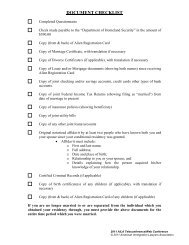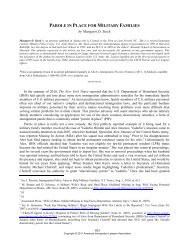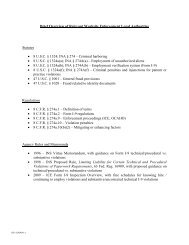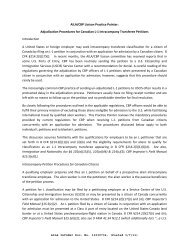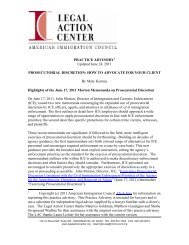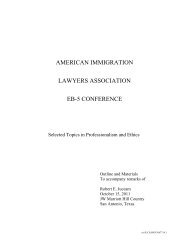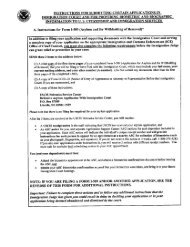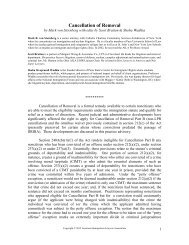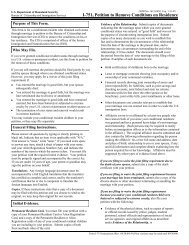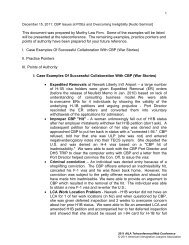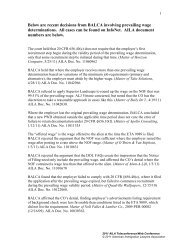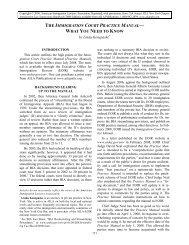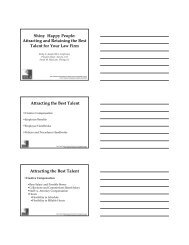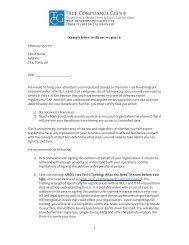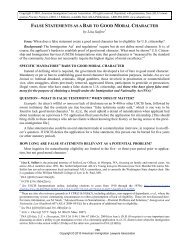Immigration Practice Pointers, 2010-11 Ed. - AILA webCLE
Immigration Practice Pointers, 2010-11 Ed. - AILA webCLE
Immigration Practice Pointers, 2010-11 Ed. - AILA webCLE
Create successful ePaper yourself
Turn your PDF publications into a flip-book with our unique Google optimized e-Paper software.
SUBJECT: Additional Guidance Regarding Surviving Spouses of<br />
Deceased U.S. Citizens and their Children (FY<strong>2010</strong> DHS Appropriations Act)<br />
AFM Update 10-09<br />
Page 2<br />
relief for these aliens. Section 568(c) entered into force on October 28,2009, the date of<br />
enactment.<br />
Sections 568(d) and (e) ofthe FY<strong>2010</strong> DHS Appropriations Act, which provide relief for aliens<br />
who are surviving beneficiaries ofcertain pending or approved petitions filed by certain<br />
qualifying categories ofnoncitizens, will be addressed in a separate memorandum.<br />
II. Background<br />
A. Prior Policy and Related Litigation<br />
For many years, U.S. immigration policy has been that a Form 1-130 could not be approved ifthe<br />
petitioner died while the Form 1-130 was pending. See Matter o/Sano, 19 I&N Dec. 299 (BIA<br />
1985); Matter o/Varela, 13 I&N Dec. 453 (BIA 1970). As far back as 1938, our immigration<br />
regulations have provided for the revocation ofthe approval ofa visa petition upon the<br />
petitioner's death. More recently, the regulations, while maintaining that general policy, have<br />
provided for discretion, for "humanitarian reasons," to reinstate the approval. 8 C.F.R. §<br />
205. I(a)(3)(i)(C)(2). Also, since 2006,8 C.F.R. § 204.2(i)(1)(iv) and 205. 1(a)(3)(i)(C)(1) have<br />
provided that the automatic revocation provision does not apply to a spousal immediate relative<br />
visa petition, ifthe deceased petitioner and the alien widow(er) had been married at least two<br />
years when the petitioner died.<br />
Over the past several years, widow(er)s ofcitizens who had died before the second anniversary<br />
ofthe underlying marriages have challenged this long-standing policy as being inconsistent with<br />
the statute. The federal courts ofappeals have split on the legal issue. Compare Robinson v.<br />
Napolitano, 554 F.3d 358 (3d Cir. 2009) (sustaining agency view that petitioner's death while a<br />
Form 1-130 is pending ends the beneficiary's eligibility); petition/or cert.jiled, No. 09- 94 (U.S.<br />
filed July 23,2009), with Taing v. Napolitano, 567 F.3d 19 (1st Cir. 2009) (holding agency<br />
policy violative ofstatute); Lockhart v. Napolitano, 561 F.3d 6<strong>11</strong> (6th Cir. 2009) (same); and<br />
Freeman v. Gonzales, 444 F.3d 1031 (9th Cir. 2006) (same). The issue has engendered much<br />
litigation before the federal district courts in recent months, with most courts ruling against the<br />
agency. Among the unfavorable decisions is. the class action ruling in Hootkins v. Napolitano,<br />
_ F. Supp. 2d _,2009 WL 2222839 (C.D. Cal. Apr. 28, 2009), which is on appeal to the<br />
Ninth Circuit Court ofAppeals. Other cases are pending in district courts throughout the United<br />
States.<br />
B. Section 568(c) of FY<strong>2010</strong> DHS Appropriations Act<br />
Congress, however, recently acted to resolve the issue. On October 28,2009, the President<br />
signed into law the FY<strong>2010</strong> DHS Appropriations Act. Section 568(c) ofthe new law amends the<br />
second sentence in section 201 (b)(2)(A)(i) ofthe INA so that, for a widow(er) ofa citizen to<br />
qualify as an immediate relative, it is no longer necessary for the couple to have been married at<br />
least two years when the citizen died. The second sentence ofsection 201 (b)(2)(A)(i) now reads,<br />
<strong>AILA</strong> InfoNet Doc. No. 09121430. (Posted on 12/14/09).



